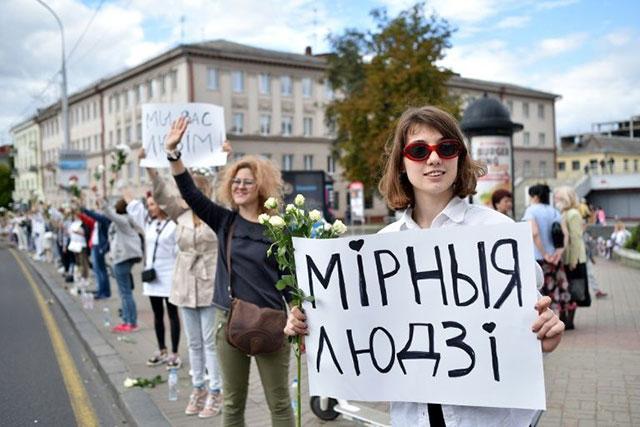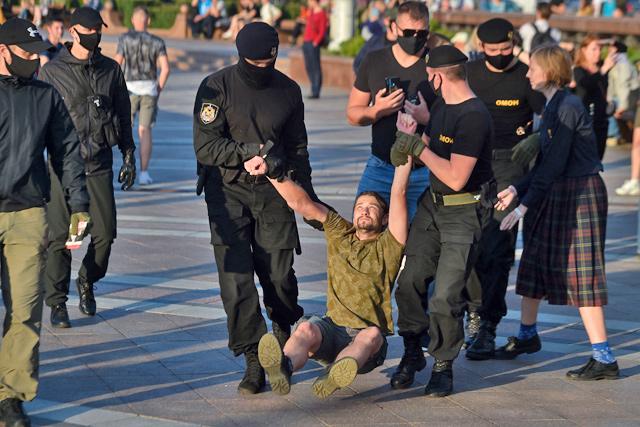You are here
Svetlana Alexievich wins Nobel Literature Prize
By AFP - Oct 08,2015 - Last updated at Oct 08,2015
STOCKHOLM — Belarussian writer Svetlana Alexievich won the 2015 Nobel Literature Prize on Thursday, honoured for her work chronicling the horrors of war and life under the repressive Soviet regime.
The Swedish Academy hailed the 67-year-old "for her polyphonic writings, a monument to suffering and courage in our time".
Alexievich has drawn international acclaim for her moving accounts of Chernobyl, World War II and the war in Afghanistan crafted through thousands of interviews with men, women and children.
"By means of her extraordinary method — a carefully composed collage of human voices — Alexievich deepens our comprehension of an entire era," the Academy wrote.
The Academy's permanent secretary Sara Danius said she had spoken to Alexievich, who reacted to the news with just one word: "Fantastic".
Alexievich, only the 14th woman to win the prize since it was first awarded in 1901, had been the top choice among literary observers and among the bookies' favourites.
Danius, speaking to the Nobel Foundation, called her "an extraordinary writer", saying "it's a history of emotions she's offering us".
By chronicling her thousands of interviews, "she's offering us a history of a human being about whom we didn't really know that much, at least not in this systematic manner. At the same time she's offering us a history of emotions. A history of the soul if you wish", she said.
Focus on personal tragedies
Alexievich takes home the sum of eight million Swedish kronor (around $950,000 or 855,000 euros). The last woman to win was Canada's Alice Munro in 2013.
Alexievich has seen her works translated into numerous languages and has scooped several international awards.
But her books, controversially written in Russian, are not published in her home country, long ruled by authoritarian President Alexander Lukashenko, amid what the author has described as "a creeping censorship".
She began tape-recording accounts of female soldiers who took part in World War II while she was working as a local newspaper reporter in the 1970s.
The resulting book, "War's Unwomanly Face", was long barred from publication because it focused on personal tragedies and did not emphasise the role of the Communist Party. It was finally published in 1985 under the perestroika reforms.
'Ear to the ground'
Alexievich later used the same technique of first-person testimonies to document the despair of mothers who lost their sons in the Soviet invasion of Afghanistan — in "Zinky Boys".
"I need to catch a person at a moment when they have been shaken up," Alexievich told Russia's Ogonyok weekly magazine.
"It's very important to listen when someone is speaking up. I always keep my ear to the ground."
In 1998, she published "Voices From Chernobyl", a collection of horrifying accounts from people who had worked on the nuclear clean-up of the 1986 disaster. The fall-out affected Belarus more than any other country.
Her most recent book "Second-Hand Time" — a non-fiction work examining the legacy of the Soviet mentality over 20 years after the collapse of Communism — was awarded France's prestigious Prix Medicis essai in 2013.
Since Lukashenko came to power in 1994, Alexievich's books have not been published in Belarus and she has lived most of her life on writers' scholarships in Italy, Germany, France and Sweden.
Alexievich has openly criticised Lukashenko's tight control of Belarus under a Soviet-style economic system and the country's continued use of the death penalty.
She has also weighed into the debate over the crisis in Ukraine by praising protestors who ousted Kremlin-backed leader Viktor Yanukovych in February 2014 for trying to shatter the links with the country's Soviet history.
"Ukraine is an example for all. The desire to break completely with the past is worthy of respect," she said in an interview.
The author has however angered the literary and intellectual elite in Belarus by writing in Russian, not in the Belarussian language, amid a strong drive to revive national culture and language.
The Nobel awards week continues on Friday with the other most closely-watched Nobel award, the peace prize.
The economics prize will wrap up this year's Nobel season on October 12.
The laureates will receive their prizes at ceremonies in Stockholm and Oslo on December 10, the anniversary of the 1896 death of prize creator Alfred Nobel, a Swedish philanthropist and scientist.
Related Articles
MINSK — Belarus strongman Alexander Lukashenko looked on Monday to the EU to ease sanctions against his regime after a landslide electoral w
MINSK — Thousands of protesters formed human chains and marched in Belarus on Thursday in a growing wave of peaceful demonstrations over Pre
MINSK — Police in Belarus arrested protest and strike organisers on Monday as authorities cracked down on opposition leaders after the lates


















